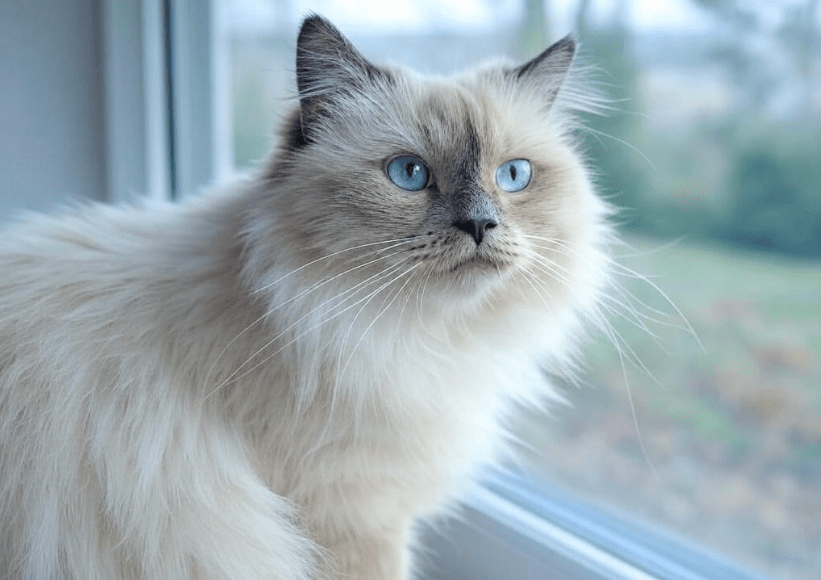
How to Choose a Vet for Your Ragdoll Cat’s Unique Needs
Choosing a vet for your Ragdoll cat is a critical decision to ensure their health and happiness. Ragdolls, with their affectionate nature, plush coats, and striking blue eyes, have unique needs that require a veterinarian skilled in feline care. A knowledgeable vet can address breed-specific concerns, from dental health to heart conditions, while fostering a stress-free experience for your gentle companion. This comprehensive guide explores how to select the ideal veterinarian for your Ragdoll, offering practical steps, key considerations, and expert tips to meet their distinct requirements.
Table of Contents
ToggleIntroduction to Ragdoll Cats and Their Veterinary Needs
Ragdolls are cherished for their docile temperament, large size, and luxurious semi-long fur, but their unique traits demand specialized veterinary care. Knowing how to choose a vet for your Ragdoll cat ensures they receive tailored attention for issues like dental disease, obesity, or hereditary conditions such as hypertrophic cardiomyopathy (HCM). A vet who understands Ragdolls’ sensitivities and health predispositions can make all the difference in their well-being.
This article provides a step-by-step guide to finding the perfect veterinarian, covering factors like expertise, clinic environment, and emergency services. Drawing on your interest in comprehensive, problem-solving content for Ragdoll owners, as seen in prior requests for health-focused articles, we aim to create the ultimate resource for selecting a vet who meets your cat’s unique needs. Whether you’re a new or experienced owner, these insights will empower you to make an informed choice.
Why Choosing the Right Vet Matters for Ragdoll Cats
Ragdolls have specific physical and emotional needs that set them apart from other breeds, making the right veterinary partnership essential. Here’s why selecting a vet carefully is crucial:
Breed-Specific Health Concerns: Ragdolls are prone to conditions like HCM, dental issues, and obesity, requiring a vet familiar with these risks.
Sensitive Temperament: Their gentle, trusting nature means they need a calm, low-stress veterinary experience, a concern you’ve addressed in stress-related content.
Preventive Care: Regular checkups catch issues early, supporting their 12–18-year lifespan, as emphasized in your health-focused articles.
Bonding and Trust: A vet who builds trust with your Ragdoll enhances their comfort, aligning with your bonding strategies.
Holistic Care: A vet who understands Ragdolls’ diet, grooming, and mental needs ensures comprehensive well-being, topics you’ve explored in diet and grooming content.
Given your prior requests for articles on Ragdoll health, such as dental care and stress management, this guide builds on those themes by focusing on veterinary selection as a cornerstone of proactive care.
Understanding Ragdoll Cats’ Unique Veterinary Needs
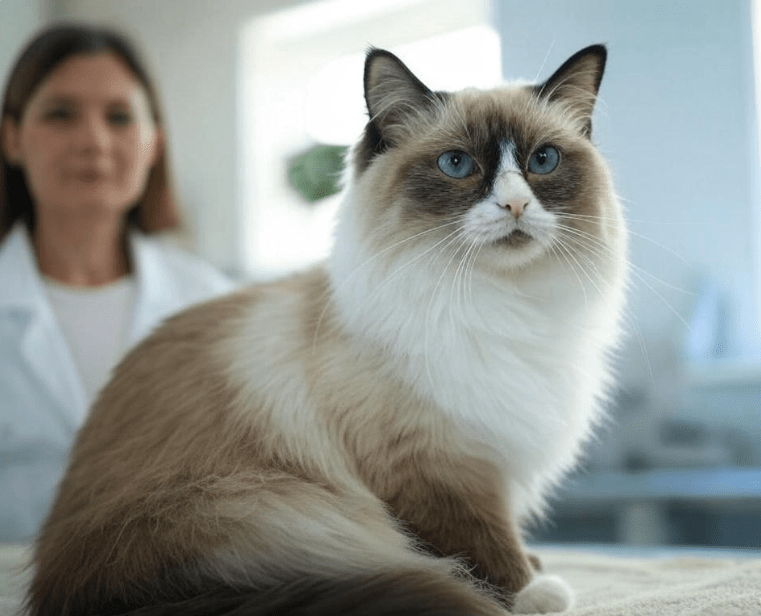
Before choosing a vet, it’s helpful to understand the specific needs of Ragdolls that influence veterinary care:
Cardiac Health: Ragdolls are predisposed to HCM, a heart condition requiring regular screening, especially in breeding lines.
Dental Health: Their large jaws can harbor plaque, leading to gingivitis or periodontal disease, a topic you’ve highlighted in dental care discussions.
Weight Management: Their relaxed nature makes them prone to obesity, necessitating dietary guidance, as you’ve covered in feeding articles.
Coat Care: Semi-long fur requires grooming to prevent matting and hairballs, which vets should monitor for skin health, aligning with your grooming content.
Emotional Sensitivity: Stress can exacerbate health issues, so a vet must prioritize low-stress handling, a recurring theme in your stress-related articles.
Large Size: Ragdolls’ size (10–20 pounds) requires appropriate equipment, like larger exam tables or carriers.
A vet who understands these needs can provide tailored care, ensuring your Ragdoll thrives.
How to Choose a Vet for Your Ragdoll Cat: 10 Key Steps
Selecting the right veterinarian involves research, evaluation, and trust-building. Below are 10 practical, vet-approved steps to choose a vet who meets your Ragdoll’s unique needs, designed to be actionable and comprehensive.
1. Seek Feline-Specific Expertise
Look for a vet with experience in feline medicine, ideally with knowledge of Ragdoll-specific issues.
Why It Matters: Cats have distinct health needs compared to dogs, and Ragdolls’ breed traits require specialized understanding.
How to Do It:
1.Check if the vet is a member of the American Association of Feline Practitioners (AAFP) or has feline-focused certifications.
2.Ask about their experience with Ragdolls or similar breeds (e.g., Maine Coons).
3.Inquire about familiarity with HCM screening or dental care for large breeds.
Pro Tip: Visit clinic websites or call to confirm their feline expertise.
Benefit: Ensures your Ragdoll receives informed, breed-specific care.
2. Prioritize a Cat-Friendly Practice
A cat-friendly clinic minimizes stress, crucial for Ragdolls’ sensitive nature, as you’ve emphasized in stress management content.
Why It Matters: Low-stress environments reduce anxiety, making visits more comfortable.
How to Do It:
1.Look for AAFP Cat Friendly Practice certification, indicating feline-specific protocols.
2.Check for separate cat waiting areas, quiet exam rooms, or pheromone diffusers (e.g., Feliway).
3.Ask about handling techniques, such as gentle restraint or minimal force.
Pro Tip: Schedule a tour to observe the clinic’s atmosphere and staff demeanor.
Benefit: Aligns with your focus on stress-free experiences, enhancing your Ragdoll’s comfort.
3. Evaluate the Vet’s Communication Style
A vet who communicates clearly and empathetically builds trust with you and your Ragdoll.
Why It Matters: Open dialogue ensures you understand diagnoses, treatments, and preventive care.
How to Do It:
1.Meet the vet for a consultation or ask questions during a phone call.
2.Assess if they explain complex issues (e.g., HCM) in simple terms.
3.Confirm they welcome questions and respect your preferences (e.g., natural remedies).
Pro Tip: Bring a list of Ragdoll-specific concerns (e.g., dental health, diet) to gauge their response.
Benefit: Fosters a collaborative partnership, supporting informed decisions.
4. Check for Comprehensive Services
Ensure the clinic offers a range of services to address Ragdolls’ diverse needs, from routine to specialized care.
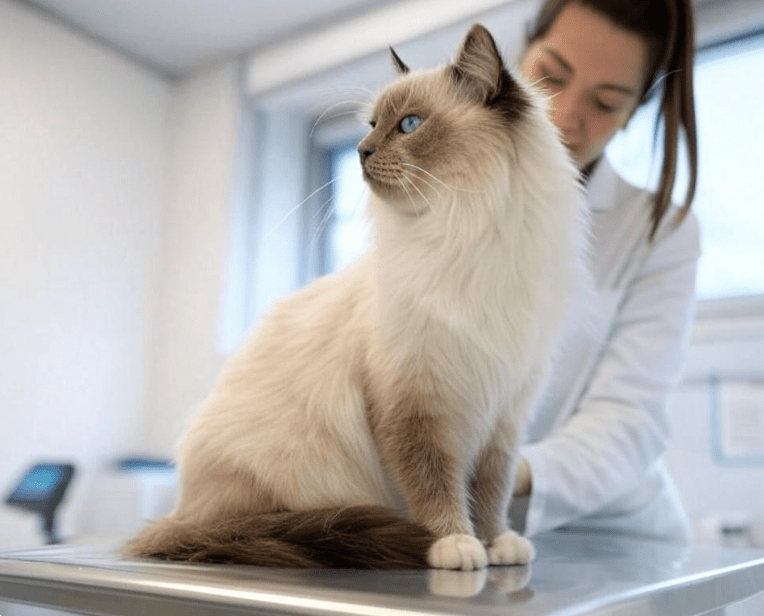
Why It Matters: Access to diagnostics, dental care, and emergency services simplifies management of breed-specific issues.
How to Do It:
1.Verify availability of in-house X-rays, ultrasound, or bloodwork for HCM screening.
2.Confirm dental services, including cleanings and extractions, given your interest in dental health.
3.Ask about nutritional counseling to prevent obesity, a topic you’ve covered.
Pro Tip: Inquire about referral networks for specialists (e.g., cardiologists) if needed.
Benefit: Provides one-stop care, streamlining your Ragdoll’s health management.
5. Assess Emergency and After-Hours Care
Ragdolls may need urgent care for issues like intestinal blockages or heart symptoms, requiring reliable emergency access.
Why It Matters: Quick response times can be lifesaving, especially for HCM-related emergencies.
How to Do It:
1.Ask if the clinic offers 24/7 emergency services or partners with a nearby emergency hospital.
2.Confirm after-hours contact options (e.g., on-call vet or hotline).
3.Check the distance to the emergency facility for accessibility.
Pro Tip: Save emergency contact details in your phone for quick access.
Benefit: Ensures peace of mind, addressing unexpected health crises.
6. Research the Clinic’s Reputation
A reputable clinic with positive reviews indicates quality care and client satisfaction.
Why It Matters: Feedback from other pet owners reflects the vet’s reliability and compassion.
How to Do It:
1.Read online reviews on Google, Yelp, or pet-focused platforms, focusing on feline care experiences.
2.Ask Ragdoll owners in local groups or forums for recommendations.
3.Check for red flags, like frequent complaints about wait times or misdiagnoses.
Pro Tip: Look for reviews mentioning gentle handling or breed-specific expertise.
Benefit: Increases confidence in your vet choice, ensuring consistent care.
7. Consider Location and Accessibility
A conveniently located clinic makes regular visits easier, especially for Ragdolls who dislike travel, as you’ve noted in stress-related content.
Why It Matters: Shorter travel reduces stress and encourages timely checkups.
How to Do It:
1.Choose a clinic within 20–30 minutes of your home.
2.Confirm parking availability or public transport options.
3.Ask about appointment flexibility, like evening or weekend slots.
Pro Tip: Practice short car rides with your Ragdoll to desensitize them, as suggested in your vet visit preparation content.
Benefit: Simplifies routine care, supporting your Ragdoll’s health.
8. Evaluate Costs and Payment Options
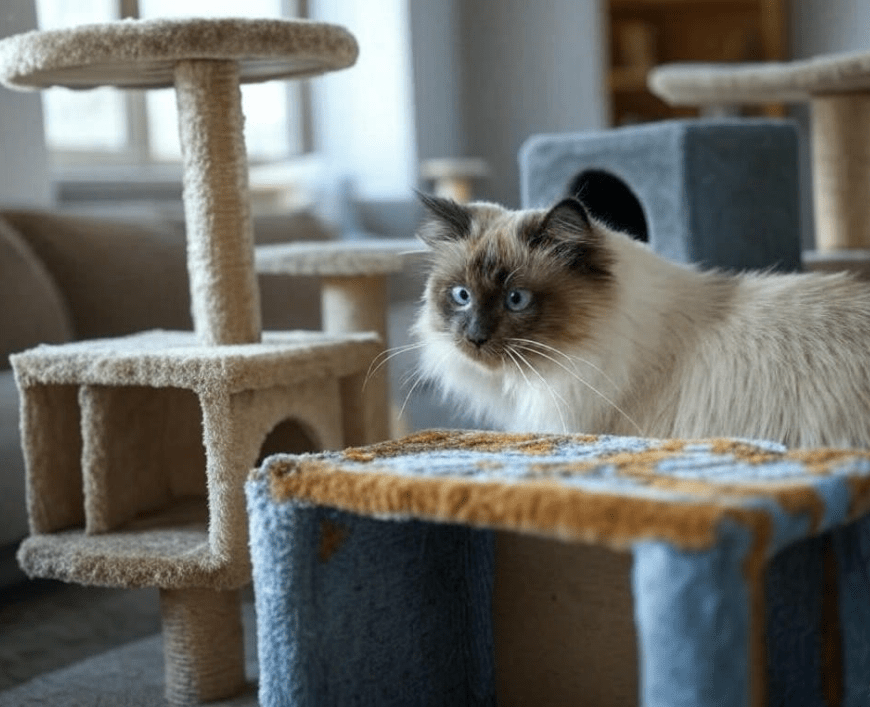
Veterinary care can be expensive, so ensure the clinic’s pricing aligns with your budget without compromising quality.
Why It Matters: Transparent costs prevent financial stress, especially for ongoing needs like dental cleanings.
How to Do It:
1.Request a fee schedule for common services (e.g., exams, vaccinations, dental work).
2.Ask about payment plans, pet insurance acceptance, or discounts for multi-pet households.
3.Compare costs among local clinics, prioritizing value over the cheapest option.
Pro Tip: Consider pet insurance to offset costs for Ragdoll-specific conditions like HCM.
Benefit: Ensures affordable, high-quality care, aligning with long-term health goals.
9. Observe the Vet’s Interaction with Your Ragdoll
A vet who handles your Ragdoll gently and builds trust is essential for their comfort.
Why It Matters: Positive interactions reduce stress and encourage cooperation during exams.
How to Do It:
1.Schedule an initial visit to observe the vet’s approach (e.g., slow movements, soft voice).
2.Note if your Ragdoll relaxes or shows signs of distress (e.g., hissing, hiding).
3.Ask about techniques for calming anxious cats, like pheromone sprays or treats.
Pro Tip: Bring a familiar blanket to comfort your Ragdoll during the visit.
Benefit: Enhances your cat’s veterinary experience, reducing stress-related issues.
10. Trust Your Instincts
Your comfort with the vet and clinic is as important as their qualifications, as a positive relationship fosters ongoing care.
Why It Matters: A vet you trust ensures open communication and confidence in their recommendations.
How to Do It:
1.Reflect on your impressions after a consultation or tour.
2.Consider if the staff is friendly, the clinic clean, and the vet approachable.
3.Switch vets if you feel uneasy, even if the clinic meets other criteria.
Pro Tip: Keep a shortlist of 2–3 clinics to compare before deciding.
Benefit: Builds a long-term partnership for your Ragdoll’s health.
Preparing Your Ragdoll for Veterinary Visits
Once you’ve chosen a vet, preparing your Ragdoll for visits minimizes stress and enhances care, a topic you’ve explored in vet preparation content. Tips include:
Carrier Training: Acclimate your Ragdoll to their carrier with treats and familiar bedding.
Short Car Rides: Practice brief drives to reduce travel anxiety.
Calming Aids: Use Feliway sprays or calming treats before visits, with vet approval.
Health Records: Bring vaccination history or prior medical records for continuity.
These steps ensure your Ragdoll feels secure, complementing your chosen vet’s efforts.
Common Mistakes to Avoid When Choosing a Vet
Steer clear of these pitfalls to find the best vet for your Ragdoll:
Choosing Based on Cost Alone: Low prices may compromise quality or expertise.
Ignoring Feline Specialization: General vets may lack Ragdoll-specific knowledge.
Overlooking Stress Factors: A chaotic clinic can distress your sensitive Ragdoll.
Skipping Research: Not checking reviews or credentials risks poor care.
Neglecting Emergency Access: Lack of after-hours care can be problematic in crises.
Conclusion
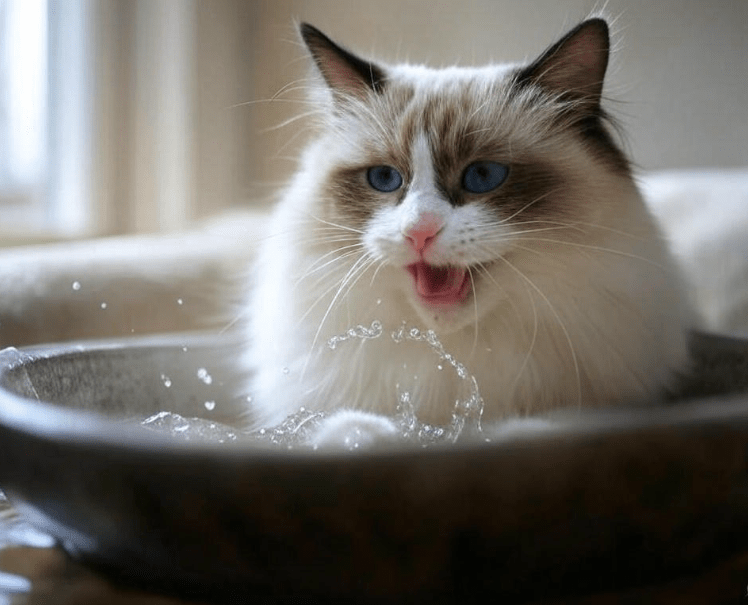
Choosing a vet for your Ragdoll cat is a pivotal step in ensuring their long, healthy life. By prioritizing feline expertise, a cat-friendly environment, comprehensive services, and a trusting relationship, you can meet your Ragdoll’s unique needs, from heart health to stress management. These steps, rooted in your interest in Ragdoll health and well-being, as seen in prior articles on dental care, stress, and diet, empower you to select a vet who becomes a true partner in your cat’s care.
Start researching local vets today, using these criteria to guide your choice. For personalized recommendations, ask other Ragdoll owners or consult online directories like the AAFP. With the right vet, your Ragdoll will thrive, bringing joy and companionship for years to come.
